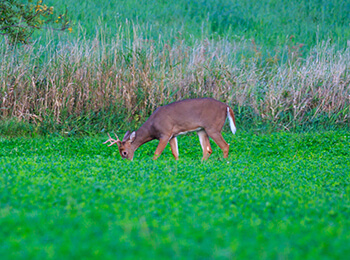Help Your Deer Pay Their Nutritional “Bills”
Aug 05, 2019

As hunters and wildlife enthusiasts, we want to have an abundant, healthy population of deer, especially lots of trophy bucks with heavy bodies and giant antlers.
Choose and provide supplements that provide energy, protein, vitamins and minerals. Using nutritional supplements such as attractants, feeds and minerals can strategically help provide nutritional abundance so that deer will mature, reproduce, and produce antlers that meet our goals and expectations.
Providing nutritional supplementation now can go a long way in reducing disappointment this fall. For more information on nutritional supplements for a healthy robust deer herd, visit the wildlife and hunting experts at your Co-op.
Choose and provide supplements that provide energy, protein, vitamins and minerals. Using nutritional supplements such as attractants, feeds and minerals can strategically help provide nutritional abundance so that deer will mature, reproduce, and produce antlers that meet our goals and expectations.
- Choose calories are involved in all the functions, and animal populations just don’t thrive with limited calories. Providing supplements that are high in energy will help assure that calories are not the limiting factor in your deer herd’s size and overall health.
- Protein is often associated with reproduction, immunity, and muscle mass. So, when energy is sufficient but protein is lacking, deer health and body weight may suffer. Antler growth requires protein, energy, and abundant minerals. In the eastern U.S., soils are often deficient in certain minerals, thus our forages and animals can be mineral deficient too. Supplementation with calcium, phosphorus, magnesium and zinc will help assure bucks can produce antlers to their genetic potential.
- Balance is important too. Too much of one nutrient or the absence of any essential nutrient may not allow your deer to perform to your expectations.
Providing nutritional supplementation now can go a long way in reducing disappointment this fall. For more information on nutritional supplements for a healthy robust deer herd, visit the wildlife and hunting experts at your Co-op.